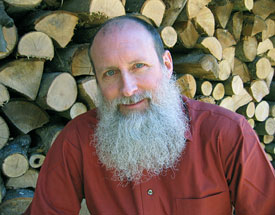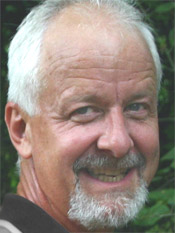Colby-Sawyer College to Host Series on Sustainability with Ecologists and University Professors Tom Wessels and Chris Uhl
NEW LONDON, N.H., April 7, 2008 – Colby-Sawyer College will host a Sustainability Series featuring ecologists and academicians Tom Wessels of Antioch University/New England and Chris Uhl of Pennsylvania State University. The events are part of the college's efforts to become a leading institution in applying sustainable practices and to communicate ways for individuals and communities to live sustainably and reduce their ecological footprint.

Antioch University/New England Professor of Ecology Tom Wessels will discuss his book “The Myth of Progress: Toward a Sustainable Future,” a valuable guide and teaching tool for scientists and non-scientists alike in understanding the relationship between ecological and economic systems. Wessels is a terrestrial ecologist and the founding director of Antioch's master's program in Conservation Biology. The lecture and discussion will take place Wednesday, April 23, at 7 p.m. in Clements Hall at the Curtis L. Ivey Science Center.
The following day, Pennsylvania State University Professor of Biology Chris Uhl will speak to what he describes as the “urgent challenge of learning how to live in a manner which does not jeopardize the future.” Author of “Developing Ecological Consciousness: Path to a Sustainable World,” Professor Uhl has combined his knowledge of medicine and ecology into what he calls “ecological healing.” The lecture and discussion will take place on Thursday, April 24, 7 p.m., in Wheeler Hall at the Ware Campus Center. The public is welcome to attend these events, and admission is free.
In “The Myth of Progress: Toward a Sustainable Future,” Professor Wessels demonstrates how our current path toward progress, based on continuous economic expansion and inefficient use of resources, runs counter to foundational scientific laws that govern complex natural systems. Wessels maintains that the widely held idea that progress can be achieved only through a growing economy is in fact a myth perpetrated by western economists, governments attracted to unlimited growth, and more recently, by a global economy dominated by large corporations. He makes scientific theory accessible through examples of how the laws of sustainability function in the natural world around us. He shows how systems such as forests can serve as templates for developing sustainable economic practices that allow true progress to occur.
“Wessels writes that people with a richness of life created through their connections with community, place, and themselves have no need to compulsively consume the 'frivolous accoutrements that we tend to think of as making us happy, but which really don't,'” wrote People's Voice Magazine. Northern Woodlands describes The Myth of Progress as an impassioned, critical and bold book. “Wessels is guided by his overwhelming sense that the laws of sustainability demand respect, understanding and interpretation, and unless we educate ourselves about their full complexity and truth, we will do irreparable damage to the landscapes we love.”

When Professor Uhl looks at the world, he sees a finite planet being overwhelmed by humans. “This is not alarmism. It is a matter-of-fact summary of what ecological research has been revealing over the past 50 years,” he said. Early in his career, as he pursued his interests in both medicine and ecology, and his life's work unfolded in a direction he describes as “ecological healing.”
During the 1980s, Uhl studied the ways in which Amazon ecosystems heal after human assaults, and in the 1990s he explored the roles that universities might play in healing by assuming leadership roles in the so-called Sustainability Revolution. “A commitment to ecological healing has also permeated my experiments and practices in the realm of teaching. My book, Developing Ecological Consciousness: Path to a Sustainable World, aims to cultivate a sense of respect and reverence for the natural world, while at the same time offering teachings and practices for discerning one's ecological identity,” he said. “My second book, Teaching as if Life Matters, (in draft form) grows out of my personal struggles as a teacher and my deep yearning to create learning environments that expand awareness and engender compassion.”
Colby-Sawyer's Path toward Sustainability
In recent years, Colby-Sawyer College has begun educating its community members about the threats of global climate change and the actions that individuals and communities can take to reduce their environmental impact on the Earth. In 2006-2007, Green ROUTES, a research project led by Community and Environmental Studies students at Colby-Sawyer, raised awareness of environmental issues and conducted a campus sustainability assessment. In May 2007, the group issued a report with guidelines for moving the campus toward sustainability, which met with wide support from the administration, faculty, staff and student body at the college.
Soon after, Colby-Sawyer President Thomas C. Galligan Jr. signed the American College & University Presidents Climate Commitment in August 2007, joining the leaders of 330 other institutions across the nation to commit to reducing global warming emissions and accelerating their educational efforts. The Presidents Climate Commitment, a program of the Association for the Advancement of Sustainability in Higher Education, was launched in June 2007, the first effort by any major sector of society to set climate neutrality as its target. President Galligan described climate change and global warming as “among the defining issues of our time” and said that “creating a culture of concern for the environment, including a commitment to sustainability, is critical to our success.”
In fall 2007, Colby-Sawyer formed an Advising Committee on Sustainability, which is working to create a comprehensive institutional action plan to move toward climate neutrality. The committee provides advice to the president and senior officers on policies and strategic objectives that will reduce the college's ecological footprint and raise sustainability awareness. Some of the activities of the committee include a successful Lights Out event on campus to raise awareness of energy consumption, meeting with outside experts, and developing data monitoring systems to track progress toward reducing our carbon footprint.
In 2008-2009, another student-led group will launch a third-year project in Community and Environmental Studies to begin to implement Green ROUTES' recommended steps toward sustainability. “Two years ago, Green ROUTES was looking ahead and recommending ways to create awareness and begin to consider ways to change as an institution,” said Leon-C. Malan, incoming chair of the newly established Environmental Studies Department. “The next group of students will start implementation and begin to make sustainable practices part of our culture.”
More information on the Green ROUTES project can be found at www.colby-sawyer.edu/academic/ces/greenroutes.
Colby-Sawyer, founded in 1837, is a comprehensive liberal arts college located in the scenic Lake Sunapee Region of central New Hampshire. Our students learn in small classes through a select array of programs that integrate the liberal arts and sciences with pre-professional experience.
Colby-Sawyer College, 541 Main Street, New London, N.H. 03257 (603) 526-3000.


